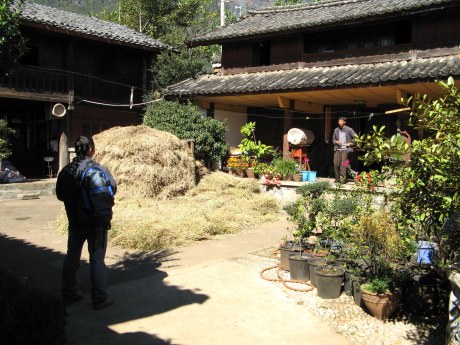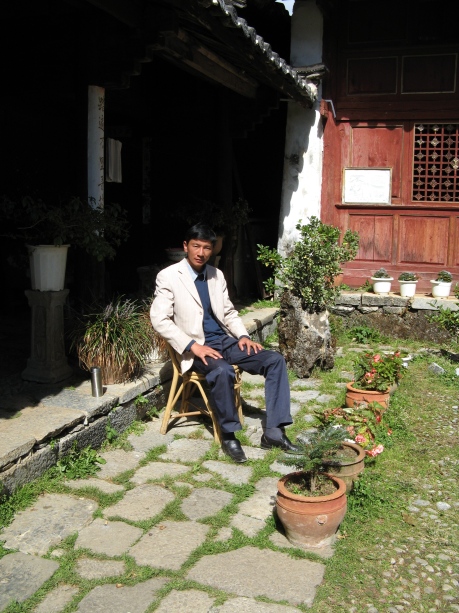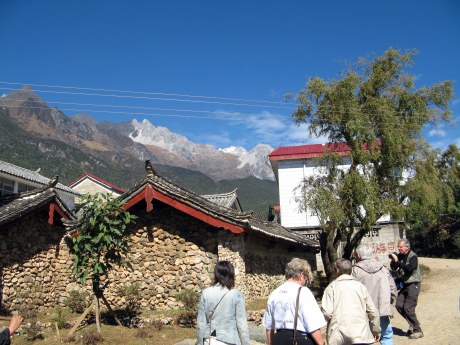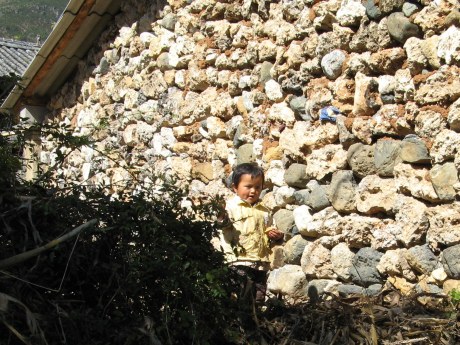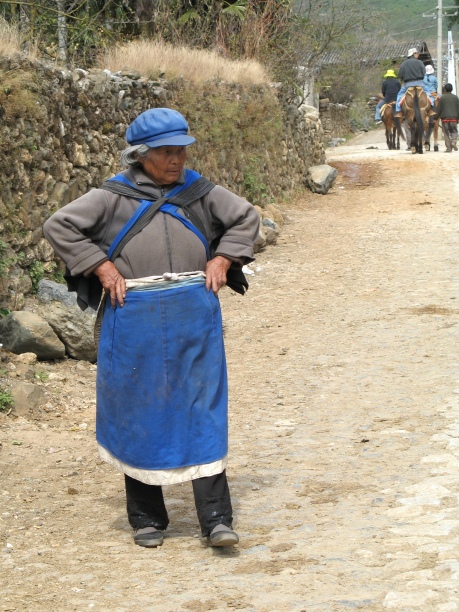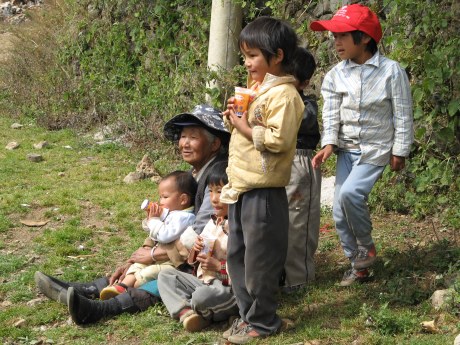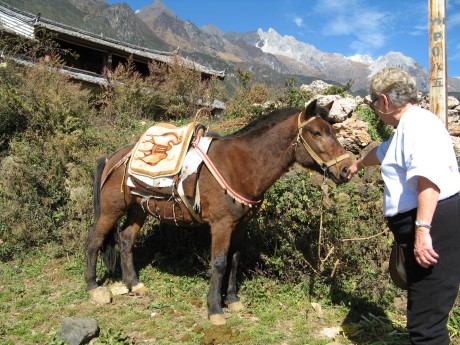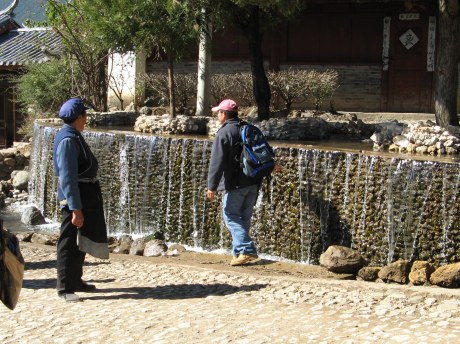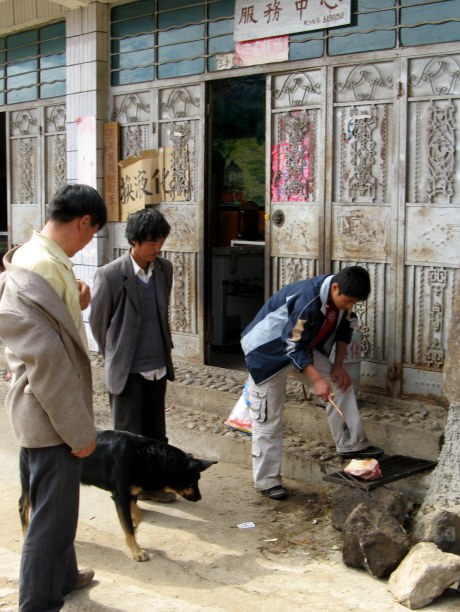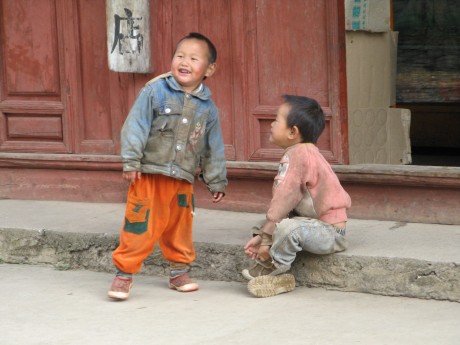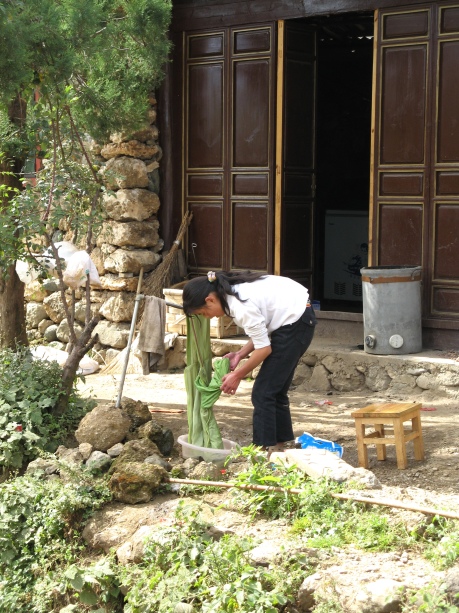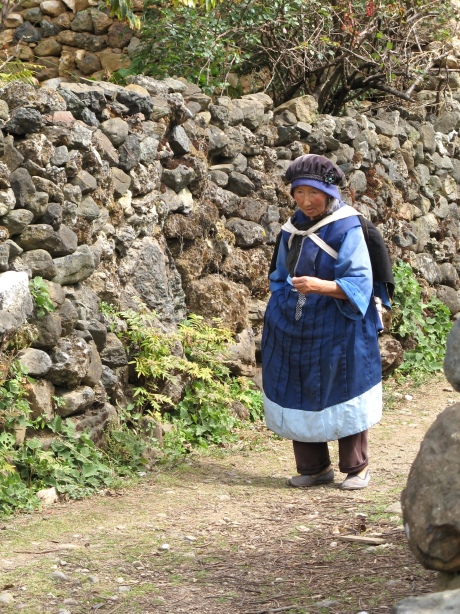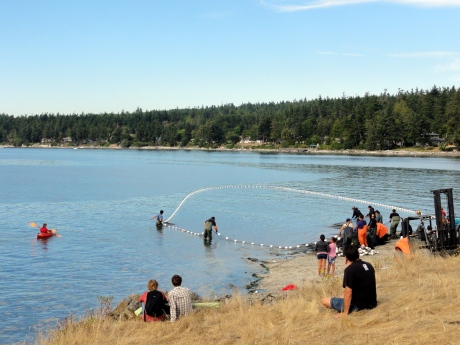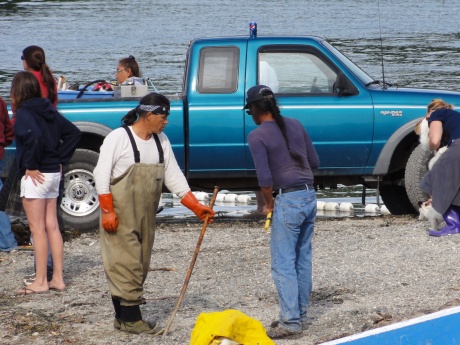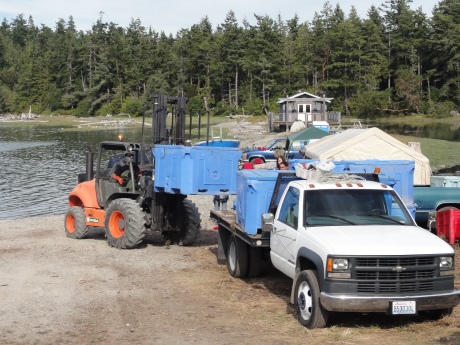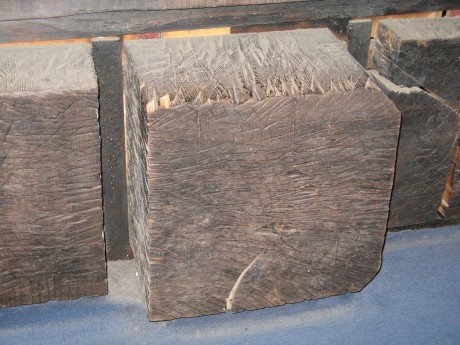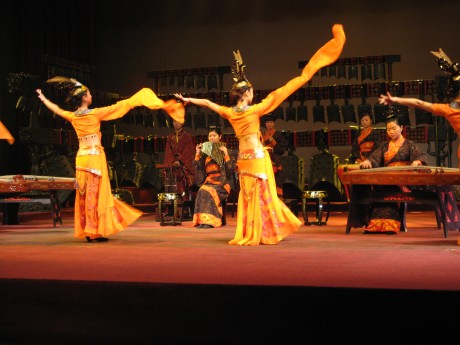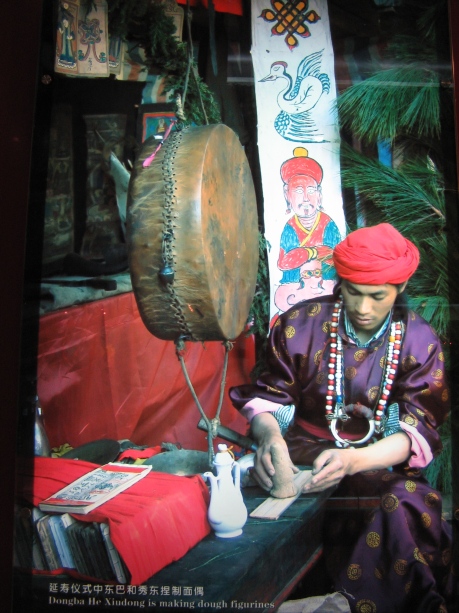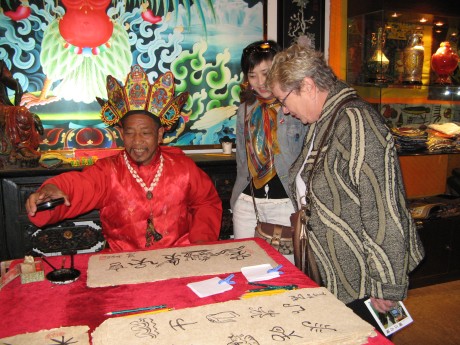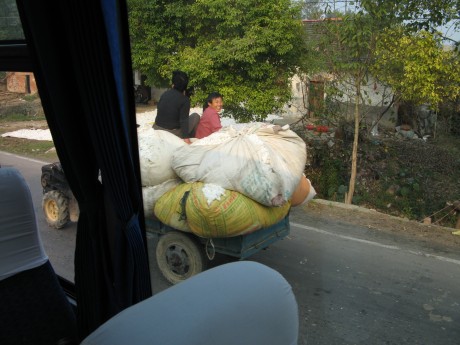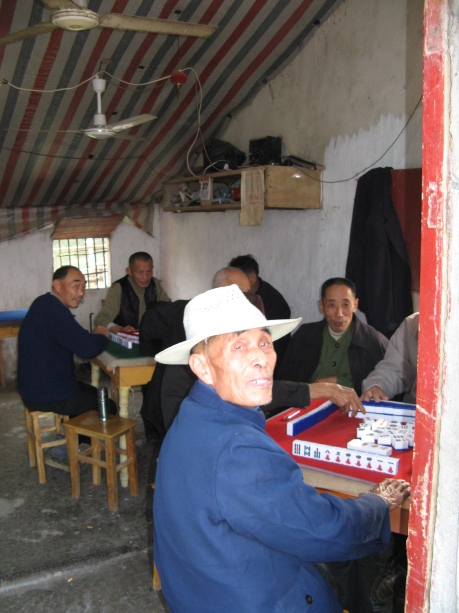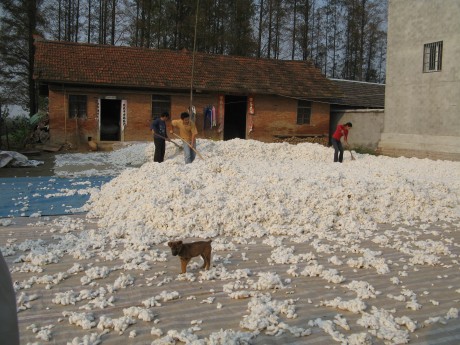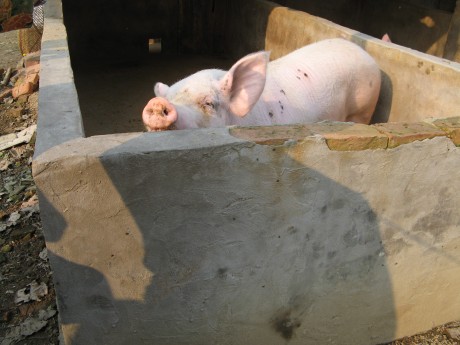Our guide Wu pushed us to leave the quaint Naxi village of Yunshangping and head up the mountain to Hanzai. The road is gravel out of the village but is paved as we near Hanzai. In the middle of nowhere, no town, no warning, we come to a huge modern restaurant that Wu tells us is the only one that serves travelerson on this rural mountain road. 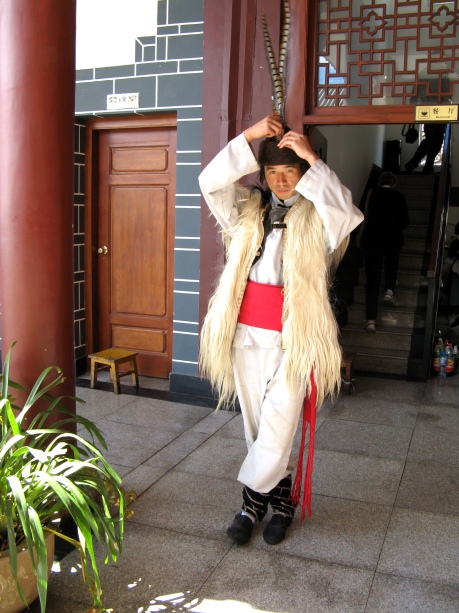
I grabbed a quick picture of a man adjusting his feathers, just because he was so exotic looking. Haven’t a clue who, what, why; no one near by to ask. A five star restaurant in a place like this? Obviously government run.

Under a bridge over terraced falls, locals are bathing their yaks in the glacial waters. Vicki okays a one minute stop for a picture because there is no place to park the bus.
 The cowboys were quite laid back, taking a break, with plenty of watchers besides the few of us who got out and grabbed a picture from above.
The cowboys were quite laid back, taking a break, with plenty of watchers besides the few of us who got out and grabbed a picture from above.

Lunch time is in full swing as we arrive in Hanzai. Braiziers and portable woks reveal a fascinating variety of foods we don’t recognize and would love to try. One can’t blame Vicki, or any tour guide for that matter, to ask us not to eat at vendors like this because then she has to deal with someone who gets sick on the tour.

Some of the foods are recognizable, but the hot pots with boiling oil, spices and chilis scenting the air mixed with a bit of burning incense wafting by? You know you aren’t in Kansas.
I’m such a foodie. Oh how I wanted to taste the hanarabi made by taking a piece of flat dough with rounds of what looks like salami wrapped inside of it and then fried in a wok that measures three feet across. And boiled peanuts. Ah…well, its a good thing Vicki made sure we were well fed. The sights and smells really are an unforgettable memory.

This young couple appeared to be getting ready to cook duck for their lunch on the sidewalk.
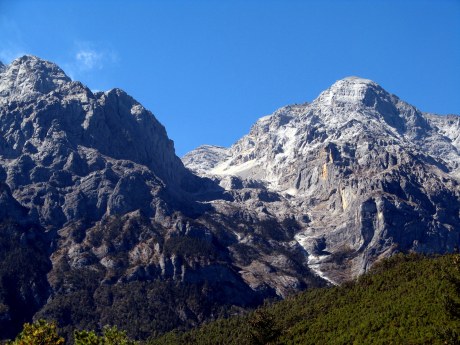
But, we are here to see and photograph the mountain, and we load into a gondola in Hanzai at 7,800 feet elevation that carries us to a flat, beautiful meadow at 10,000 feet.

We take the boardwalk about a half mile through the woods and run into exotically costumed Naxi people from the Mossel tribe and they are not shy about picture taking.

Since it is lunch time, these people appear to be enjoying a picnic on the grass.

We arrive at the meadow and see 30 or more kiosks and soon learn why these Naxi people are readily photographed.
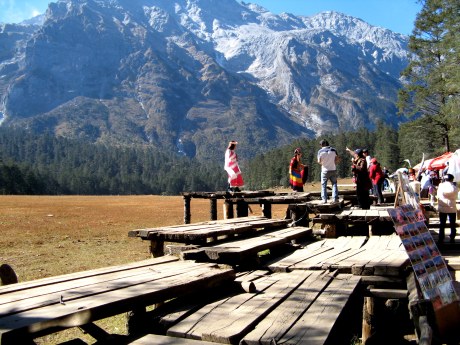
For what to us is a small fee you can have your picture taken with a costumed Naxi with the beautiful mountain in the background. Chinese tourists line up for the pose but our group avoided the commercialism and simply enjoyed the atmosphere.

Riding the gondola back down was particularly enjoyable for the beautiful view of the surrounding area.

I talked to my gondola mate and she couldn’t understand a word I said. She spoke to me and I couldn’t understand a word she said. We smiled and talked. She accented to a picture. As the gondola nears the bottom it slows for the photographers to take a picture with their polaroids. They quickly lay them out so that by the time you get unhitched you can see your picture and buy it. I thought I’d buy the picture for my friendly companion. She held up a hand and said, “No pay!” She bought the picture for me, instead. I was grateful that I remembered how to say thank you in Chinese. She indicated that I should walk with her and she took me to meet her daughter. Annie, it turns out, spoke perfect English. She was on vacation from San Diego. What a delightful exchange.
When I got on the bus, everyone was talking about the Chinese sex manuals. Sex manuals? It turned out I was the only one who hadn’t seen them. One of my tour mates pointed at a kiosk in the bus parking lot. The bus was running but Vicky wasn’t aboard yet. I got off the bus and bought one. Tedd told me at dinner that night that some of the workers on board the ship had surreptitiously tried to sell him those same carvings. He didn’t buy and I did. We laughed. I was curious and obviously so was everyone else or they wouldn‘t have been talking about them. I passed them around the bus for everyone to see. They are 2 inch square pieces of bone joined together in a circle like a bracelet, showing sexual positions.
I complained about the pit toilets at the tourist center? Oh, these were much worse. Thank goodness I’m a camel and could choose to wait until we got back to Jiliang.

I grabbed a quick picture of a man adjusting his feathers, just because he was so exotic looking. Haven’t a clue who, what, why; no one near by to ask. A five star restaurant in a place like this? Obviously government run.

Under a bridge over terraced falls, locals are bathing their yaks in the glacial waters. Vicki okays a one minute stop for a picture because there is no place to park the bus.
 The cowboys were quite laid back, taking a break, with plenty of watchers besides the few of us who got out and grabbed a picture from above.
The cowboys were quite laid back, taking a break, with plenty of watchers besides the few of us who got out and grabbed a picture from above.
Lunch time is in full swing as we arrive in Hanzai. Braiziers and portable woks reveal a fascinating variety of foods we don’t recognize and would love to try. One can’t blame Vicki, or any tour guide for that matter, to ask us not to eat at vendors like this because then she has to deal with someone who gets sick on the tour.

Some of the foods are recognizable, but the hot pots with boiling oil, spices and chilis scenting the air mixed with a bit of burning incense wafting by? You know you aren’t in Kansas.

I’m such a foodie. Oh how I wanted to taste the hanarabi made by taking a piece of flat dough with rounds of what looks like salami wrapped inside of it and then fried in a wok that measures three feet across. And boiled peanuts. Ah…well, its a good thing Vicki made sure we were well fed. The sights and smells really are an unforgettable memory.

This young couple appeared to be getting ready to cook duck for their lunch on the sidewalk.

But, we are here to see and photograph the mountain, and we load into a gondola in Hanzai at 7,800 feet elevation that carries us to a flat, beautiful meadow at 10,000 feet.

We take the boardwalk about a half mile through the woods and run into exotically costumed Naxi people from the Mossel tribe and they are not shy about picture taking.

Since it is lunch time, these people appear to be enjoying a picnic on the grass.

We arrive at the meadow and see 30 or more kiosks and soon learn why these Naxi people are readily photographed.

For what to us is a small fee you can have your picture taken with a costumed Naxi with the beautiful mountain in the background. Chinese tourists line up for the pose but our group avoided the commercialism and simply enjoyed the atmosphere.

Riding the gondola back down was particularly enjoyable for the beautiful view of the surrounding area.

I talked to my gondola mate and she couldn’t understand a word I said. She spoke to me and I couldn’t understand a word she said. We smiled and talked. She accented to a picture. As the gondola nears the bottom it slows for the photographers to take a picture with their polaroids. They quickly lay them out so that by the time you get unhitched you can see your picture and buy it. I thought I’d buy the picture for my friendly companion. She held up a hand and said, “No pay!” She bought the picture for me, instead. I was grateful that I remembered how to say thank you in Chinese. She indicated that I should walk with her and she took me to meet her daughter. Annie, it turns out, spoke perfect English. She was on vacation from San Diego. What a delightful exchange.
When I got on the bus, everyone was talking about the Chinese sex manuals. Sex manuals? It turned out I was the only one who hadn’t seen them. One of my tour mates pointed at a kiosk in the bus parking lot. The bus was running but Vicky wasn’t aboard yet. I got off the bus and bought one. Tedd told me at dinner that night that some of the workers on board the ship had surreptitiously tried to sell him those same carvings. He didn’t buy and I did. We laughed. I was curious and obviously so was everyone else or they wouldn‘t have been talking about them. I passed them around the bus for everyone to see. They are 2 inch square pieces of bone joined together in a circle like a bracelet, showing sexual positions.
I complained about the pit toilets at the tourist center? Oh, these were much worse. Thank goodness I’m a camel and could choose to wait until we got back to Jiliang.
